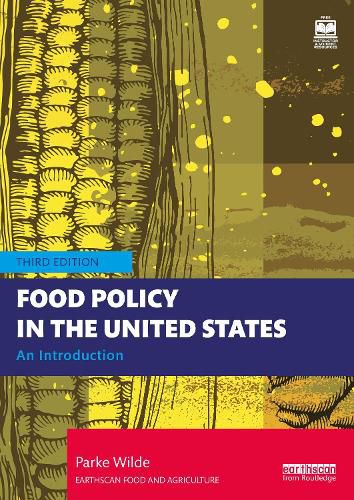Readings Newsletter
Become a Readings Member to make your shopping experience even easier.
Sign in or sign up for free!
You’re not far away from qualifying for FREE standard shipping within Australia
You’ve qualified for FREE standard shipping within Australia
The cart is loading…






This third edition of Food Policy in the United States offers a timely update to the leading textbook dedicated to all aspects of food policy in the United States.
This book begins with the economic interests of farmers and food producers and then moves on to examine nutrition policy, food justice, food security, and the environment. Finding motivation in real-world controversies and debates, chapters cover domestic agriculture, international agricultural trade, food and beverage manufacturing, food retail and restaurants, food safety, dietary guidance, food labeling, advertising, and federal food assistance programs for the poor. Building on the success of the second edition, which received the Distinguished Quality of Communication award from the Agricultural and Applied Economics Association (AAEA), this new edition has been revised and updated, offering greater attention both to food justice issues, and to economic methods. It covers policy changes since the 2018 Farm Bill, the publication of the 2020-2025 Dietary Guidelines for Americans, the 2021 update to the "Thrifty Food Plan", and President Donald Trump's approach to food and agricultural trade. The impact of COVID-19 and the continuing climate crisis are examined, alongside stalled child nutrition reauthorization legislation, reforms in food-labeling, and immigration policy. The online Instructor and Student Resources include supplemental economic appendices, problem sets, activities, and exercises: www.routledge.com/cw/Wilde. This book makes U.S. food policy more comprehensible to those inside and outside the agri-food sector whose interests and aspirations have been ignored.
This book is essential reading for all students, researchers, and policymakers seeking to understand U.S. food policy from a wide range of interdisciplinary backgrounds, including food studies, agricultural and food economics and policy, public health and nutrition, and public policy.
$9.00 standard shipping within Australia
FREE standard shipping within Australia for orders over $100.00
Express & International shipping calculated at checkout
This third edition of Food Policy in the United States offers a timely update to the leading textbook dedicated to all aspects of food policy in the United States.
This book begins with the economic interests of farmers and food producers and then moves on to examine nutrition policy, food justice, food security, and the environment. Finding motivation in real-world controversies and debates, chapters cover domestic agriculture, international agricultural trade, food and beverage manufacturing, food retail and restaurants, food safety, dietary guidance, food labeling, advertising, and federal food assistance programs for the poor. Building on the success of the second edition, which received the Distinguished Quality of Communication award from the Agricultural and Applied Economics Association (AAEA), this new edition has been revised and updated, offering greater attention both to food justice issues, and to economic methods. It covers policy changes since the 2018 Farm Bill, the publication of the 2020-2025 Dietary Guidelines for Americans, the 2021 update to the "Thrifty Food Plan", and President Donald Trump's approach to food and agricultural trade. The impact of COVID-19 and the continuing climate crisis are examined, alongside stalled child nutrition reauthorization legislation, reforms in food-labeling, and immigration policy. The online Instructor and Student Resources include supplemental economic appendices, problem sets, activities, and exercises: www.routledge.com/cw/Wilde. This book makes U.S. food policy more comprehensible to those inside and outside the agri-food sector whose interests and aspirations have been ignored.
This book is essential reading for all students, researchers, and policymakers seeking to understand U.S. food policy from a wide range of interdisciplinary backgrounds, including food studies, agricultural and food economics and policy, public health and nutrition, and public policy.